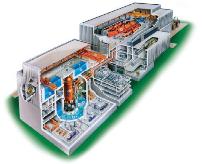Poland's largest power group, Polska Grupa Energetyczna (PGE), has signed a second cooperation agreement with a potential builder of the country's first nuclear power plant, this time with GE-Hitachi.
 |
GE Hitachi's ABWR |
GE-Hitachi senior vice president Danny Roderick said his company's engagement in other power projects in Poland had given it an understanding of the country's "unique" circumstances. "PGE's move to develop a nuclear power project is a positive step toward improved energy security and reducing carbon emissions in Poland - two strategic priorities for the country," he said.
The agreement is not the first that PGE has signed with foreign companies interested in cooperating on a new Polish nuclear plant. An agreement with Electricité de France (EdF) signed in November 2009 provided for joint feasibility studies into the possible construction of Areva's EPR pressurised water reactor design. While PGE management board president Tomasz Zadroga welcomed the partnership with GE Hitachi, he stressed that his company was still keeping its options open. "As we prepare to build Poland's first commercial nuclear power plants, we are pleased that GE Hitachi Nuclear Energy is offering us their expertise," he said, adding: "We are committed to carefully choosing a reactor technology that meets our economic and technical priorities."
Like the EdF agreement, the agreement with GE Hitachi does not contain an exclusivity clause, and PGE has openly declared its intention of signing similar agreements with other partners.
Poland has the largest reserves of coal in the European Union (EU). It generates 93% of its electricity from coal, and is a net electricity exporter. However, with its own electricity demand forecast to grow by 90% by 2025, and with stringent EU restrictions on CO2 emissions, the country's cabinet decided in 2005 that it should move immediately to introduce nuclear power to diversify energy supplies as well as reduce CO2 and sulphur emissions.
Four 440 MWe Russian VVER-440 units were under construction at Zarnowiec in northern Poland during the 1980s. The project was cancelled in 1990 and the components were sold, but the site remains a contender for one of the two new plants.
Researched and written
by World Nuclear News




_53504.jpg)

_13505.jpg)
_87975.jpg)






